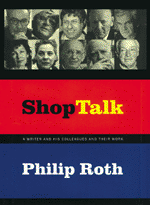 On
the shelf
On
the shelf
Reading
Shop Talk: A Writer and His Colleagues and Their Work (Houghton
Mifflin, 2001) is akin to eavesdropping. In a collection of previously
published interviews and essays, Philip
Roth, AM'55, talks with Primo Levi about work in a
paint factory ("At the peak of my career, I numbered among the
thirty or forty specialists in the world…."); with Milan Kundera
about the importance of a sense of humor ("I could always recognize
a person who was not a Stalinist, a person whom I needn't fear,
by the way he smiled."); and with Edna O'Brien about the role
her childhood plays in her work ("It's the price of being a writer.
One is dogged by the past-pain, sensations, rejections, all of
it.").
 In
addition to these conversations and exchanges with writers Aharon
Appelfeld, Ivan Klíma, Isaac Bashevis Singer, and Mary McCarthy,
Roth includes essays about painter Philip Guston and fellow American
novelists Bernard Malamud and Saul Bellow, X'39. In "Rereading
Saul Bellow," he ends by asking the same question about Bellow
that Henderson asks about another character in Henderson the
Rain King (1959): "What's he in Chicago for?"
In
addition to these conversations and exchanges with writers Aharon
Appelfeld, Ivan Klíma, Isaac Bashevis Singer, and Mary McCarthy,
Roth includes essays about painter Philip Guston and fellow American
novelists Bernard Malamud and Saul Bellow, X'39. In "Rereading
Saul Bellow," he ends by asking the same question about Bellow
that Henderson asks about another character in Henderson the
Rain King (1959): "What's he in Chicago for?"
"Not
until the third book, Augie March," writes Roth, "did Bellow
fully apprehend Chicago as that valuable hunk of literary property,
that tangible, engrossing American place that was his to claim
as commandingly as Sicily was monopolized by Verga, London by
Dickens, and the Mississippi River by Mark Twain." Thirty years
later, in The Dean's December, Roth argues, that sense
of connection is gone: "The book's very point is that this huge
place is Bellow's no longer."
- M.R.Y.

![]()
 On
the shelf
On
the shelf In
addition to these conversations and exchanges with writers Aharon
Appelfeld, Ivan Klíma, Isaac Bashevis Singer, and Mary McCarthy,
Roth includes essays about painter Philip Guston and fellow American
novelists Bernard Malamud and Saul Bellow, X'39. In "Rereading
Saul Bellow," he ends by asking the same question about Bellow
that Henderson asks about another character in Henderson the
Rain King (1959): "What's he in Chicago for?"
In
addition to these conversations and exchanges with writers Aharon
Appelfeld, Ivan Klíma, Isaac Bashevis Singer, and Mary McCarthy,
Roth includes essays about painter Philip Guston and fellow American
novelists Bernard Malamud and Saul Bellow, X'39. In "Rereading
Saul Bellow," he ends by asking the same question about Bellow
that Henderson asks about another character in Henderson the
Rain King (1959): "What's he in Chicago for?"